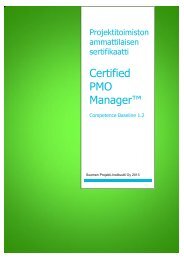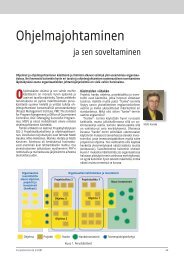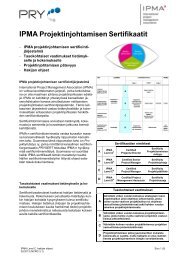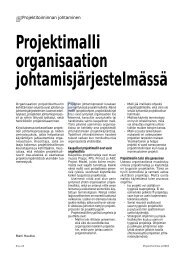Boundary activities and readiness for ... - Projekti-Instituutti
Boundary activities and readiness for ... - Projekti-Instituutti
Boundary activities and readiness for ... - Projekti-Instituutti
Create successful ePaper yourself
Turn your PDF publications into a flip-book with our unique Google optimized e-Paper software.
Theoretical background<br />
Grønhaug, 2004; Thiry, 2004a, 2004b; Woodward, 1982). The early stage<br />
also involves the creation of relationships with those outside the core team<br />
to ensure the required support <strong>for</strong> the program (Woodward, 1982). The<br />
emerging program needs to be integrated into the parent organization <strong>and</strong><br />
communication channels must be established (Gareis, 2000).<br />
Related to the early project <strong>and</strong> program stages, there is a growing stream<br />
of literature on the front-end of innovation, i.e. the early phase of<br />
innovation be<strong>for</strong>e the <strong>for</strong>mal decisions on the development (e.g. Murphy &<br />
Kumar, 1996; Nobelius & Trygg, 2002; Poskela, 2009). The innovation<br />
front-end is often described as “fuzzy” (Reid & de Brentani, 2004),<br />
highlighting the related uncertainty <strong>and</strong> ambiguity. Literature on the<br />
innovation front-end is concerned with idea generation <strong>and</strong> concept<br />
development, focusing mainly on product <strong>and</strong> service innovations. Change<br />
programs rather involve process, organizational, or management<br />
innovations (Trott, 2002), which have received less research attention.<br />
The present study aims to provide empirically rooted research evidence<br />
on the early program <strong>activities</strong>, examining an emerging change program’s<br />
interplay with its parent organization. More research has been requested to<br />
better underst<strong>and</strong> the early stage of a temporary organization <strong>and</strong> its<br />
linkages with the subsequent lifecycle stages (Atkinson et al., 2006). The<br />
current study links the early program stage to program execution by<br />
studying how the early <strong>activities</strong> create <strong>readiness</strong> <strong>for</strong> program<br />
implementation.<br />
Compared to the project management tradition, the program<br />
management approach is more in<strong>for</strong>med by the literature on strategic<br />
change <strong>and</strong> organization development (Pellegrinelli, 2002). To better<br />
underst<strong>and</strong> the nature of change programs <strong>and</strong> their role in the larger<br />
organizational context, the literature on organizational change is reviewed<br />
in the next section.<br />
2.2 Initiating large-scale organizational change<br />
This section summarizes the relevant literature on organizational change<br />
from the perspective of this dissertation. After providing a brief overview to<br />
the literature on planned organizational development <strong>and</strong> change, the focus<br />
is set on the management of large-scale organizational change by<br />
examining issues that are related to successful change program initiation.<br />
Finally, the concept of <strong>readiness</strong> <strong>for</strong> change program implementation is<br />
introduced.<br />
2.2.1 Introduction to large-scale organizational change<br />
Change is pervasive in today’s turbulent business environment.<br />
Organizational change may be defined simply as a trans<strong>for</strong>mation of an<br />
27









